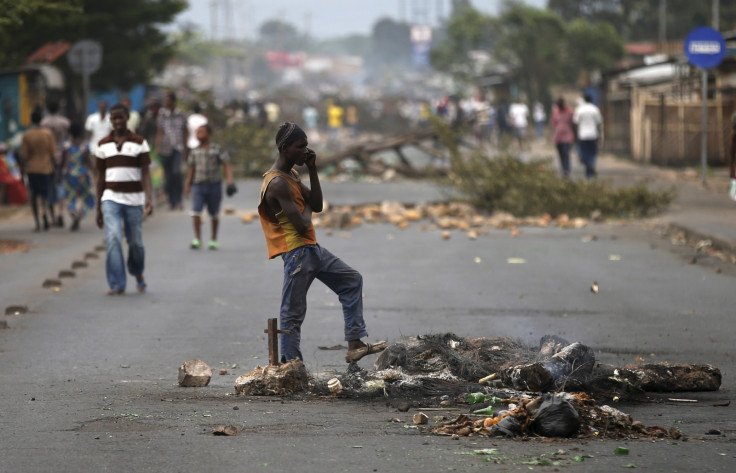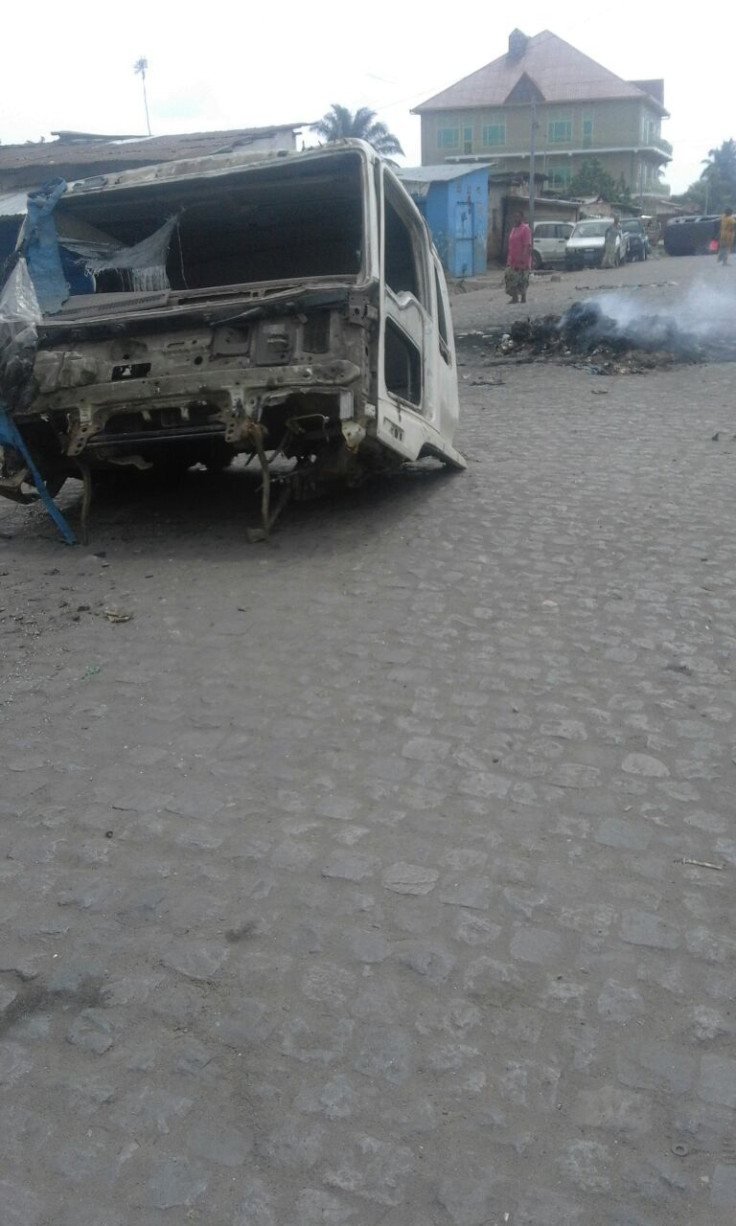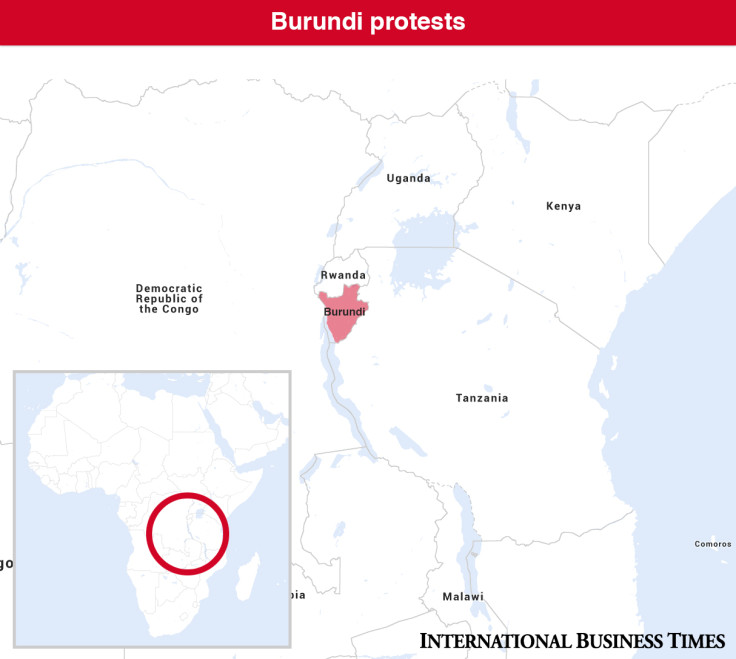Burundi elections 2015: Violence spills into Bujumbura's Muslim district for first time

Demonstrations erupted into violence on Tuesday (26 May) for the first time in a Muslim neighbourhood close to Burundi's capital as protesters continue to clash with police forces.
Protesters, who are demanding that President Pierre Nkurunziza withdraws his third-term bid in the upcoming 26 June elections, descended on the streets on Monday (18 May) for the first time since a failed coup on 13 May. The demonstrators say a third term in power violates the country's constitution and the Arusha Accords, a peace deal that ended an ethnic civil war in 2005.
But on 26 May, the violence spilled into the Buyenzi district, a predominantly Muslim neighbourhood.
Halidi, a local Buyenzi resident, said he had heard live rounds being fired early on in the morning in Bujumbura's commercial district. Police used tear gas on protesters.
"People barricaded the roads, the avenue and all the shops are closed. Protesters have taken tyres and some have been burned. The situation is very tense," he told IBTimes UK from his home. "The young people are still in the streets, bickering with the police. We heard gun shots."
Halidi, who has been holed up in his house, blamed the violence on a worsening situation. He said: "Everything is closed, shops, garages. We are all at home and cannot go out. It's difficult to even buy first necessity products."

Zedi Feruzi's alleged assassination
Halidi said one of the reasons for this unexpected uprising – Buyenzi is known to be a calm area and the district's youth had so far not joined in the protests – was the murder on Saturday (23 May) evening of an opposition leader, Zedi Feruzi, and his bodyguard, who were killed at point blank range by unidentified men with Kalashnikovs.
Feruzi, the Muslim leader of a minority party, the Union for Peace and Democracy (UPD), was killed on his way home in the capital's district of Ngagara at around 7pm local time. He was walking home and stopped to chat with a Burundian journalist he had just met.
A neighbour, who was not present at the scene but who was nearby at the time of the incident, said he heard 20 shots before a Toyota car fled hastily. Feruzi sustained bullets in the head and the chest.
The journalist from Bonesha FM radio survived and said he saw the attackers were wearing the presidential guard uniform. But the president's adviser, Willy Nyamitwe, claimed the murder was a manoeuvre to accuse the government.
For Halidi, Feruzi's death has pushed people into the streets because Buyenzi residents "are members of the UPD", and Feruzi was expected to receive the vote of 70% of the Muslim community.
However, Halidi added, most of the young people he spoke to in the streets said they were "against the third mandate, that's all".
Feruzi had declared the constitution has "certain ambiguous items" but "the Arusha agreement is very clear. The principle is based on two [presidential] terms".
It is estimated that between 8% and 10% of the Burundian population is Muslim.
During the ethnic conflicts between Hutus and Tutsis in 1993 and 1995 to 1996, Muslims stayed out of the clashes that killed an estimated 300,000 people.
At the time, Buyenzi was dubbed the "Swiss" neighbourhood of Bujumbura, because of its overall neutrality, as residents said they identified themselves as Muslims, and not as Hutus or Tutsis.
Ambiance très tendue dans quartier Buyenzi. Tirs reprennent. Manifestants ont brûlé voitures pic.twitter.com/YfVC2Ll0AG
— Jean Philippe remy (@jpremylemonde) May 26, 2015One dead, 21 injured
In the district of Kanyosha, witnesses described a tense battle between police forces and protesters on 26 May.
"The police arrested seven protesters, so the demonstrators took one policeman hostage," a source who wished to remain anonymous told IBTimes UK. "Then, the military got involved and tried to free the policeman. So the protesters burned everything."
One man was killed in clashes between protesters and police forces in the district of Bwiza on 25 May.
The Croix Rouge told IBTimes UK on 26 May that it attended to 21 injured people a day earlier.
Meanwhile, France said it was suspending its security cooperation with Burundi. This will include both police and defence forces, according to a diplomatic source.
And the Burundian government has called on the population to help finance the contested elections with donations, via an open bank account named "Elections 2015".
UPDATE
(15:53 GMT 26 May) Burundi's civil society lawyer, Belgian attorney Bernard Maingain, said he believes the situation has deteriorated sharply in Burundi since the death of opposition leader Zedi Feruzi.
Representatives of Burundi's civil society are currently in consultation with representatives of the African Union and the United Nations.
"The civil society has (taken) a very tough stance against the government, especially after the assassination of Fehuri. For now the dialogue is at breaking point, nearing an implosion," he told IBTimes UK over the phone.
"I think if there is no urgent diplomacy that is taking place to try to resolve this crisis we will only achieve a conflict with disastrous consequences on the human and military fronts. I am very afraid of the radical positions and the confrontation."
The United Nation's Security Council on Friday 8 May received a file containing the details of the alleged assassinations of 22 figures of the Burundian opposition, as revealed by IBTimes UK.
Maingain said a file - which he managed to sneak out of Burundi - included allegations about a secret service plot to kill those against the President Pierre Nkurunziza's contested third term.
Burundi's government has strongly denied any such allegation.

© Copyright IBTimes 2024. All rights reserved.






